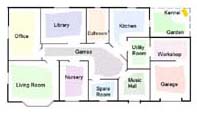|
MOBILE BROADBAND
What is
mobile broadband?
Mobile broadband allows you to connect to
the internet, wherever you are. Just as it's possible to make telephone
calls wherever you happen to be using your mobile phone, mobile broadband
allows you to connect to the internet in much the same way – you plug a
USB modem into your laptop, and away you go.
| The USB modem – also
known as a ‘dongle' - connects you to the internet using the
mobile phone networks, so you don't have to go looking for a WiFi
hotspot, or try to read your emails from the screen of your mobile
phone – you can do all the browsing you want, wherever you are. |
 |
So
why isn't everyone using it?
 |
Mobile broadband
connections are not yet always as fast as fixed line connections, so
it is not yet a full replacement for home broadband – although in
the future it may well be. However, mobile broadband is extremely
handy for anyone who works on the move, or anyone who just likes to
stay connected whilst out and about. |
It also works really well for anyone who
doesn't want to get involved with landlines, cables and modems and such
– so for example people who rent accommodation short term and students
who move house a lot. The great thing about your mobile broadband
connection is that wherever you go, it goes.
How
do I get it?
Here in the UK there are six main mobile
broadband suppliers, and not by coincidence they are the big mobile phone
network providers: 3, O2, Orange, T-Mobile, Vodafone and Virgin.
As with mobile phone deals, each supplier
offers a wide range of different options at different prices, so it pays
to shop around. One of the easiest ways to do this is to use an
independent online comparison service, such as
Mobile
Broadband Genie. Rather than trawling round suppliers' websites to see
what's on offer, use the comparison site to get a good picture of what's
what.
To get you started, here's some things to
look for when assessing the different options.
| Freebies.
One good starting point is the extras which are being offered with
mobile broadband contracts. Suppliers are very keen to get your
custom, so there are a lot of good extras being thrown in, one of
the best of which are free laptops.
You pay a bit more for a contract
which includes a laptop, but if you don't already have one and want
to get online on the move then this is a great place to start. |
 |
Speed. Bear in mind when
you look at advertised speeds that they use the magic words “up to”
whatever speed they offer. This means that you are not guaranteed to get
that speed, so bear that in mind when shopping around.
Data cap. This is
basically a restriction on the amount of data you can transfer per month.
Data caps start at 1GB which is relatively low, but generally the average
user will be fine with a 3GB limit. There are some quite pricey penalties
for over-use, though, so if you go for a low data cap make sure you know
what you're entitled to and read the small print.
Length of contract. Contracts are usually 12, 18 or 24 months.
There are pay-as-you-go options available for those not keen to commit,
although with pay as you go you will probably be asked to pay for the USB
modem, which is normally thrown in free with a contract.
About the author:
Ciaron Dunne is editor of www.broadbandgenie.co.uk,
the independent comparison website for broadband and mobile broadband.
Copyright © 2000-2020
Hints and Things
All Rights Reserved.
No portion of this site may be reproduced or redistributed without prior
written permission from Hints and Things. All trademarks & copyrights
throughout Hints and Things remain the property of their respective
owners.
Hints and Things cannot be
held responsible for any information given on this site nor do they
necessarily agree with, or endorse, the views given by third parties. |




